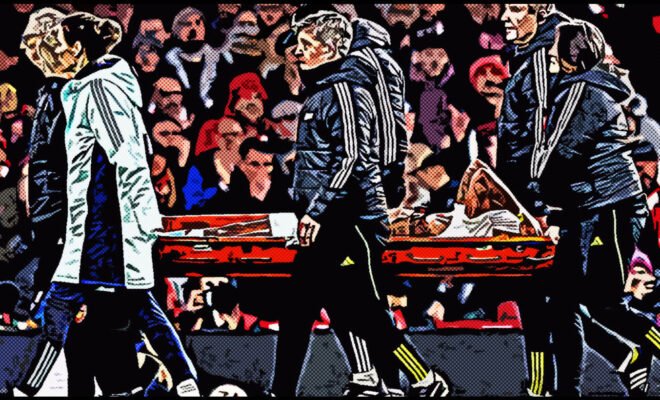Gary Neville Says Arsenal Have Regressed — But the Data Tells a Very Different Story

Gary Neville doesn’t mince words. Whether you agree with him or not, when the former Manchester United defender delivers a hot take, it tends to make headlines. That was the case again this past weekend, when Neville labelled Arsenal’s 2024/25 season a “big let-down” during NBC Sports’ coverage of their 1-1 draw against Brentford. He went even further, suggesting Mikel Arteta’s side had “gone backwards” from last season.
At face value, with Arsenal trailing Liverpool in the Premier League title race and a third straight second-place finish looking likely, some fans may be tempted to agree. But look a little deeper, and Neville’s argument starts to unravel.
This isn’t a team in decline. If anything, it’s a squad that’s battled through incredible adversity — including one of the worst injury crises of any top European side — and still finds itself in the upper tier of both the Premier League and the Champions League. The idea that Arsenal have regressed is not just misleading. It’s flat-out wrong.
Context Matters: Arsenal’s Injury Crisis Has Been Brutal
One of the most glaring omissions from Neville’s criticism is context — specifically, injuries. Arsenal have been without a full-strength squad for most of the season, and not just missing rotation players. They’ve lost cornerstone pieces in every department.
Here’s just a sample of the injury list Arsenal have dealt with this season (accurate as of April 2025):
-
Gabriel Jesus – cruciate ligament tear, out since January (25 games missed)
-
Kai Havertz – hamstring injury, out since February (18 games missed)
-
Takehiro Tomiyasu – knee surgery, out long-term (26+ games missed)
-
Martin Ødegaard – ankle injury (12 games missed)
-
Gabriel Magalhães – hamstring tear requiring surgery (13 games missed, season-ending)
-
Bukayo Saka – recurring knocks (10+ games missed)
-
Kieran Tierney – hamstring (18 games missed)
-
Ben White – groin/knee issues (25 games missed)
-
Oleksandr Zinchenko – calf injury (7 games missed)
-
Jurrien Timber – muscular problems
-
Riccardo Calafiori – knee injury (10 games missed)
That’s over a combined 150+ matches missed across Arsenal’s starting XI and key backups. There isn’t a single team in the top six — not even injury-stricken Newcastle — that has experienced that level of disruption this season.
And yet, Arsenal are still standing. They’re still competitive in the league. And they’re flying in Europe.
Arsenal’s European Evolution Can’t Be Ignored
What Neville also failed to mention — and it’s surprising — is Arsenal’s performance in the Champions League. This season marks a turning point in the club’s European trajectory.
The Gunners dismantled Real Madrid 3-0 at the Emirates in the first leg of their quarter-final tie. Not edged, not scraped by — dismantled. This wasn’t a one-off performance either. Arsenal have shown tactical maturity and composure throughout the campaign, adapting well to the higher tempo and unpredictability of knockout football.
Reaching the semi-final would be their first in 15 years, and if they go one step further — if they lift the trophy — we’re talking about one of the greatest seasons in the club’s modern history. But even if they fall short, their growth in Europe is clear proof that Arteta is building something with depth and substance.
Regression? Hardly.
What Does “Regression” Even Mean in This Context?
Neville’s reasoning — that Arsenal failed to capitalize on a down year for Manchester City — might sound reasonable at first. But it lacks nuance. Yes, City have been less dominant. Yes, Arsenal were considered potential favorites. But title races aren’t theoretical.
It’s not just about capitalizing when others fall. It’s about adapting to your own circumstances. Arsenal’s injuries, compounded by an already thin attacking line, made consistency a challenge — particularly in the final third.
Let’s also be real: finishing second in the Premier League three years in a row is not evidence of stagnation. It’s consistency. It’s elite-level performance over an extended period, something Arsenal hadn’t managed for nearly two decades. And let’s not forget, the margin has narrowed over time — just two points separated Arsenal and City last season.
If anything, the only area where Arsenal haven’t taken a leap this season is their goal output. That’s a legitimate concern — they’ve scored fewer goals compared to last season — but it’s also tied directly to the absence of key players like Jesus, Havertz, and Saka.
Robbie Mustoe Got It Right
Thankfully, not everyone on the NBC panel jumped on the “regression” bandwagon. Robbie Mustoe offered a grounded and thoughtful counterpoint, arguing:
“I still think they are going to be the second-placed team again for the third season on the trot. The injuries to key players at different parts of the season have to be considered. Liverpool are the only team to have had very few injuries. That makes a difference.”
That’s the type of analysis that gives credit where it’s due without ignoring real shortcomings. Arsenal do need a proper No. 9. They still haven’t found a top-tier, 25-goal striker to lead the line. But that’s not a sign of regression — it’s a common final hurdle for young, emerging title challengers.
Conclusion: This Is a Team on the Rise — Not in Decline
If Arsenal limp to the end of the season without a trophy, there will be plenty of questions — and Arteta will face fair scrutiny. But let’s call it what it is: a season full of setbacks that has been navigated with admirable resilience.
Neville’s comments might make for good TV, but they don’t tell the full story. Arsenal haven’t regressed — they’ve endured. They’ve evolved. They’ve competed at a high level, in spite of losing key players almost every month of the season. And if the Champions League ends in glory, Neville may find himself walking back that soundbite sooner than he thinks.

